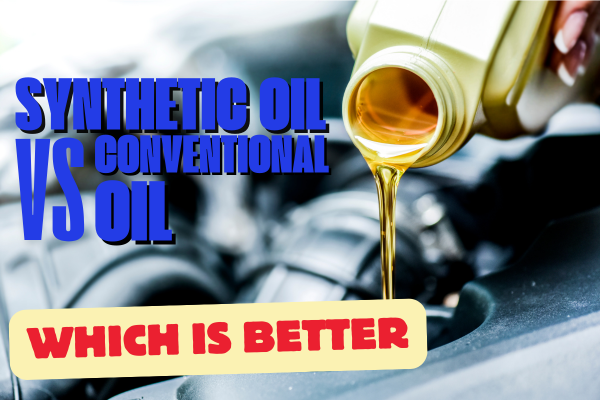Choosing the right motor oil isn’t just a routine decision—it’s key to your car’s performance and lifespan. Synthetic and conventional oils each have unique advantages, but they perform differently under various conditions. Synthetic oil offers better protection in extreme temperatures and reduces engine wear, while conventional oil might suit older engines or budget-conscious drivers. Understanding these differences can help you make the best choice for your vehicle’s needs. Let’s break it down.

Understanding Oil Types
When choosing motor oil for your car, it’s essential to understand the difference between conventional and synthetic oil. Each type is created differently and serves unique purposes. Let’s break it down.
What is Conventional Oil?
Conventional oil comes from crude oil extracted from the ground. This crude oil is sent to refineries, where it undergoes distillation and purification processes. During distillation, the crude oil is heated and separated into different components based on their boiling points. The portions suitable for motor oil are then refined further to remove impurities and enhance their performance.
While conventional oil provides reliable lubrication for engines, it contains natural impurities that can degrade over time. It’s like having a natural product with inherent limitations—it works, but its performance can vary under demanding conditions like extreme heat or cold.
What is Synthetic Oil?
Synthetic oil, on the other hand, is created using advanced chemical processes. It starts with either petroleum-based materials or other chemical compounds, which are broken down and then rebuilt at a molecular level. This process allows manufacturers to design synthetic oil with uniform molecular structures that enhance its performance.
Additives such as detergents, dispersants, and anti-wear agents are mixed in during manufacturing, giving synthetic oil its superior qualities. This engineering approach makes synthetic oil a high-performing option, especially in extreme temperatures or high-stress conditions. Think of it as a tailor-made suit for your car’s engine—precisely crafted and designed to perform consistently.
Understanding these distinctions can help you decide which oil aligns best with your car’s needs.
Key Benefits of Synthetic Oil
Switching to synthetic oil is like giving your car a premium upgrade in its daily operations. It’s not just about lubrication—it’s about keeping your engine in peak condition, no matter the circumstances. Here’s why synthetic oil outshines conventional options.
Better Engine Protection
Synthetic oil excels at minimizing engine wear. Its uniform molecules flow more smoothly compared to the inconsistent properties of conventional oil. This reduces friction between moving parts, acting as a buffer against wear and tear over time. Think of it as adding a suit of armor to your engine’s most delicate components. Whether you’re stuck in stop-and-go traffic or enjoying an open-road cruise, this protection remains consistent.
Improved Temperature Stability
Extreme temperatures can challenge your car’s oil. Conventional oil thickens in the cold and thins out in high heat, but not synthetic oil. It’s engineered to maintain its viscosity across a wide temperature range. This stability ensures reliable engine starts on frigid mornings and prevents breakdown during intense summer heat. Modern synthetic oils are crafted to handle these extremes effortlessly, keeping your engine running smoothly no matter the weather.

Photo by Pixabay
Enhanced Fuel Economy
By reducing friction, synthetic oil can improve fuel efficiency. Less resistance in your engine means it doesn’t have to work as hard, conserving energy. Over time, this can translate into noticeable savings at the pump. It’s like giving your car a boost without requiring any extra effort from its engine. While the savings may seem incremental at first, they add up over the long haul.
Longer Change Intervals
Synthetic oil is designed for durability. Its resistance to breakdown means it can last significantly longer between oil changes. Conventional oils often need changing after 3,000 to 5,000 miles, but synthetic oils can perform well for 7,500 to even 10,000 miles or more. This extended life benefits not only your engine but also your schedule and budget. Fewer oil changes mean less hassle and fewer trips to the mechanic.
Synthetic oil isn’t just a product—it’s a high-performance solution. By offering cutting-edge engine protection, exceptional temperature resilience, improved efficiency, and extended change intervals, it outpaces conventional oil on every front. Each of these factors makes it a compelling choice for car owners who want better performance and less maintenance.
Advantages of Conventional Oil
Conventional oil has been a reliable choice for countless drivers over the years. While synthetic oils are often marketed as high-performance solutions, conventional oil still holds its ground by offering unique benefits in specific scenarios. Let’s explore.
Cost-Effectiveness
One of the most significant advantages of conventional oil is its affordability. It’s far less expensive than synthetic oil, making it the go-to choice for budget-conscious drivers. For instance, synthetic oil changes can sometimes cost double or even triple compared to conventional oil changes.
If you’re maintaining an older vehicle or simply trying to keep up with regular oil changes without breaking the bank, conventional oil provides a practical option. Why pay extra when a more economical solution works perfectly for your needs?

Photo by Daniel Andraski
Availability and Familiarity
Conventional oil is everywhere. The wide availability means you don’t have to search far to find it, whether you’re at a local gas station or your mechanic’s shop. Its long-standing presence in the market also makes it a familiar option for mechanics and car owners alike.
For routine oil changes, many drivers stick with what they know works. This familiarity brings a sense of reliability, especially when you’re seeking something tried and true.
Suitability for Older Engines
If you’re driving an older vehicle, chances are it was designed with conventional oil in mind. These engines typically don’t require the advanced formulations of synthetic oils. In fact, older engines sometimes perform better with conventional oil due to their compatibility and lower detergency, which avoids dislodging debris that could harm the engine.
For drivers of vintage cars or high-mileage vehicles, sticking with conventional oil can provide optimal lubrication while also being gentle on older components. Think of it as a safe choice for engines built in an era when conventional oil was the standard.
Conventional oil continues to serve a purpose, especially when cost, availability, and older vehicle compatibility are key factors. If these align with your needs, it’s a solid choice that gets the job done.
Which Oil Should You Choose?
Choosing the best motor oil for your car comes down to understanding your unique needs. Your vehicle’s specifications, driving habits, and long-term goals all interact to determine which oil is the better choice for you. Let’s take a look at these factors to guide your decision-making process.
Consider Your Vehicle’s Requirements
Every car is different, and so are its oil requirements. To know what’s best, start with your car’s owner manual. Manufacturers make specific oil recommendations based on the engine’s design and performance needs. For example:
- Newer vehicles: Often benefit from synthetic oil due to its advanced formulation and enhanced protection.
- Older engines: Might perform better with conventional oil, especially if they’ve been using it for years without issues.
Ask yourself: does your car have a turbocharged engine or high mileage? These conditions might push you toward synthetic oil for better wear protection, while a simpler engine could do fine with conventional oil. It’s about compatibility more than anything.
Driving Conditions and Habits
Your driving style and the environment in which you drive play a huge role in oil selection. Do you make frequent short trips or sit in bumper-to-bumper traffic? How about extreme temperatures? These factors place different demands on your oil.
Here’s how it breaks down:
- Frequent short trips: Synthetic oil provides an edge because it resists breakdown better, even with cold starts.
- Extreme heat or cold: Synthetic oil maintains proper viscosity, protecting your engine. Conventional oil may struggle in such extremes.
- Daily highway driving: Either oil works, but synthetic’s fuel efficiency can make a difference over time.
Driving habits are like exercise routines—what works for a jogger isn’t the same as what a sprinter needs. Think about how you use your vehicle and choose accordingly.
Long-Term Vehicle Goals
What are your future plans for your car? If you’re aiming to extend its lifespan or maintain its resale value, synthetic oil might serve you better. Its properties reduce engine wear and keep components running cleaner for longer—perfect if you’re planning to keep your car for years.
On the other hand, if you treat your car more as a short-term asset or have an older model nearing the end of its lifespan, conventional oil might suffice. It gets the job done without the extra cost, making it a practical choice for vehicles with no long-term plans.
Oil choice goes beyond just engine maintenance—it’s a small investment toward your car’s future. Whether you’re looking for longevity or just keeping things running smoothly today, think about where your vehicle fits in your plans.
Final Thoughts
Synthetic oil stands out for its ability to protect engines, perform well in extreme conditions, and reduce maintenance frequency. However, conventional oil remains a dependable choice for those prioritizing cost or maintaining older vehicles.
When choosing between them, consider your car’s needs, driving habits, and long-term goals. The right oil isn’t just a maintenance decision—it impacts reliability, efficiency, and longevity. Make an informed choice to keep your engine running its best.
What’s your top priority for engine performance? Share your thoughts or experiences below!

One thought on “Synthetic Oil vs. Conventional Oil: Which Is Better for Your Car?”